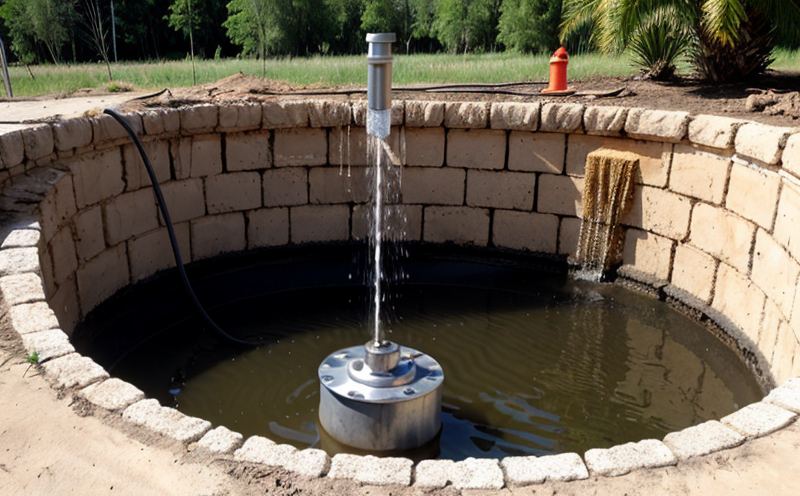Groundwater protection inspection
The integrity and protection of groundwater resources are paramount in maintaining environmental health and safety. Groundwater constitutes a significant portion of the world's fresh water supply, making its protection critical for both human consumption and ecological balance. In many regions, groundwater is the primary source of drinking water, making it essential to monitor and safeguard this resource from contamination.
The process of inspecting and protecting groundwater involves several key steps aimed at ensuring that the aquifer remains uncontaminated by pollutants such as chemicals, heavy metals, and other hazardous substances. This inspection typically begins with a comprehensive site evaluation to identify potential sources of contamination. Following this initial assessment, various testing methods are employed to assess the quality of the groundwater.
Testing parameters include pH levels, total dissolved solids (TDS), specific conductance, microbial content, and the presence of volatile organic compounds (VOCs) and semi-volatile organic compounds (SVOCs). The use of advanced instrumentation such as portable multi-parameter meters and flow-through systems helps in obtaining accurate measurements. Sample preparation involves collecting water samples from various depths within the aquifer to ensure a representative sample is analyzed.
Once collected, these samples are analyzed using standard laboratory procedures aligned with international standards like ISO 14681 for microbiological testing of drinking water and ASTM D7390 for the determination of petroleum hydrocarbons in water. The results from these analyses provide critical data that helps determine the overall health of the groundwater system.
Based on the findings, corrective actions can be recommended to prevent further contamination. These may include implementing better waste management practices, enhancing monitoring protocols, or installing treatment systems to remediate existing contamination. Regular inspections are necessary to ensure ongoing compliance and protection of these vital resources.
The importance of groundwater protection cannot be overstated in the realm of environmental health and safety. By adhering to strict testing procedures and employing advanced technologies, laboratories play a crucial role in safeguarding this essential resource for future generations.
Why It Matters
The quality and purity of groundwater are directly linked to public health and environmental sustainability. Groundwater contamination can lead to severe health issues among populations reliant on it as a primary water source, including gastrointestinal diseases, neurological disorders, and even cancer.
Economic impacts also arise from the need for alternative water sources or costly remediation efforts following contamination incidents. Ensuring groundwater protection through regular inspections helps mitigate these risks, fostering sustainable development practices that benefit both current and future communities.
From a regulatory standpoint, compliance with environmental laws and regulations is crucial to avoid penalties and fines. By conducting thorough inspections and adhering to best practices outlined by organizations such as the Environmental Protection Agency (EPA) or equivalent bodies in other countries, organizations demonstrate their commitment to responsible stewardship of natural resources.
In summary, groundwater protection inspections are vital for maintaining public health, supporting economic stability, ensuring regulatory compliance, and promoting sustainable development. These efforts contribute significantly towards creating safer environments where people can live healthier lives without jeopardizing future generations' access to clean water sources.
Industry Applications
- Drinking Water Supply: Ensuring that communities have access to safe and clean drinking water is a primary concern. Groundwater inspections help identify potential contaminants before they affect public health.
- Agricultural Practices: Farmers depend on groundwater for irrigation purposes. Regular monitoring ensures that agricultural activities do not lead to contamination, thereby protecting crop yields while preserving soil quality.
- Industrial Operations: Industries must minimize their impact on the environment by minimizing waste disposal methods that could harm nearby aquifers. Inspection services aid in identifying areas where improvements are needed.
- Municipal Water Systems: Cities rely heavily on groundwater as a source of potable water. Inspections help maintain these supplies free from pollutants, ensuring reliable service for millions of residents.
The above applications highlight how critical it is to protect groundwater resources through rigorous inspection processes. Failure to do so can have far-reaching consequences that affect numerous stakeholders across various sectors.
Customer Impact and Satisfaction
Customers who invest in regular inspections for their groundwater protection enjoy several benefits including peace of mind knowing they are doing everything possible to safeguard this precious resource. They also benefit from reduced risk of legal action due to non-compliance with environmental regulations, which can be costly both financially and reputationally.
In addition to regulatory compliance, customers gain assurance that their operations remain sustainable over time. This translates into long-term savings through avoided costs associated with cleanup efforts or switching to alternative water sources when contamination issues arise. Furthermore, satisfied customers often report higher levels of employee morale because they feel part of a responsible organization contributing positively to society.
Client testimonials further emphasize the value proposition offered by comprehensive groundwater protection inspection services. Many clients express satisfaction with the thoroughness and reliability provided by these inspections, noting that it has significantly enhanced their ability to meet environmental goals effectively.





